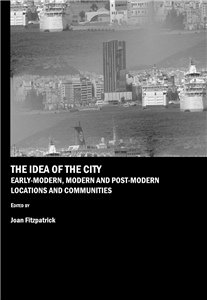This is a head work page, grouping together all editions of this title listed on the site. Browse through ‘All Editions’, Rights information, and Permissions information, to find a rights contact, or a particular edition.
Description
"Joan Fitzpatrick’s The Idea of the City represents a fascinating snapshot of the current state of literary urban studies. Conference proceedings can often seem diffuse or tokenistic, but this collection offers unity on several levels. For a start, many of the contributors ask similar questions of their material, approaching it with an informed awareness of the ways in which the city has been theorised as well as actually traversed from the medieval period to the present. While one would expect work of this type and standard from established and widely-published scholars such as Pamela Gilbert and Julian Wolfreys, it is refreshing to see how new researchers are blending the cartographic with the psychological to raise important questions about the perception, analysis, and mythologisation of urban and metropolitan space.
The collection is impressively eclectic, ranging from Petrarch’s Avignon to modern Los Angeles, and from 18th century Lichfield to operatic re-imaginings of Venice. As I said, however, the collection is unified at a deep level by the contributors’ shared interest in city writing, and by their conviction that there is a complex relationship between space, place, and self. This means that the book would be of use and interest to those working on individual writers (including contemporary novelists such as Niall Griffiths, on whom little has yet been published) and in the more general areas of urban and cultural studies and critical theory. The collection as a whole allows the reader to revisit the ideas of influential works from the previous decade, such as Keith Tester’s The Flâneur (1994), Sophie Watson and Katherine Gibson’s Postmodern Cities and Spaces (1995), and Susana Onega and John Stotesbury’s London in Literature: Visionary Mappings of the Metropolis (2002). It is therefore both a useful round-up of established ideas from various city-centred disciplines, and a starting point for the fresh consideration of enduringly suggestive material."
—Dr Nick Freeman, Loughborough University, Author of Conceiving the City: London, Literature, and Art 1870-1914
"In this substantial volume the editor has assembled an international line-up of scholars working on the city from the Renaissance to the present. This is an important and timely work that has depth as well as breadth. Interdisciplinary and cross-period collections like this which straddle several historical periods run the risk of appealing only in part to coherent scholarly communities, but Dr Fitzpatrick has structured the collection in a way which plays to the strength of critics working within particular periods while clearly displaying the latticework of links between the book's strongly marked sections. There is an excellent balance between historical and theoretical readings, between textual and contextual approaches, and between interventions that are author or text based and those that deal with broader themes and issues. The range of contributors is matched by the richness and variety of perspectives. I would strongly recommend this book to students working in the early modern period, and also to those interested in modern developments. It is a comprehensive, intelligently organized and richly researched volume that is likely to be well received, well reviewed and well read. I will certainly be ordering copies for my own University library and including it on reading lists for future courses."
—Professor Willy Maley, University of Glasgow
Author Biography
Rights Information
All Rights Available



